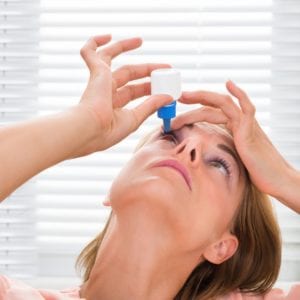
What is Dry Eye Syndrome and Why Does it Develop?
We may all get dry eyes from time to time. Dry eye syndrome is characterized by the frequent or ongoing issue in which the tear film evaporates too quickly, causing uncomfortable symptoms. Tears aren’t just for crying; they are present at all times on the ocular surface. The tear film is made of mucus, oil, and water in perfect ratios. Throw off the ratios and the tear film falls short of doing its job well. Without sufficient coverage over the ocular surface, the eyes feel gritty, irritated with a burning or itching sensation, and excessively watery. The inflammation on the ocular surface can also cause redness and blurry vision.
Research has not pinpointed an exact reason for the connection between dry eye syndrome and menopause. It is assumed that the change in hormones may be involved, However, studies also suggest that women taking hormone replacement therapy may also experience dry eye syndrome. This information leaves doctors and patients in the position of looking for alternative ways to manage eye health.
Treating Dry Eye Syndrome
Whether related to menopause or not, dry eye syndrome deserves effective intervention. To help improve the quality of the tear film, we may look at diet and supplementation options. We may prescribe eye drops that soothe and lubricate the eyes. Medications may also be taken to promote optimal tear production. Clinical treatments such as LipiFlow can also be beneficial. LipiFlow is a brief office procedure that heats and vibrates the eyelids to unblock tear-producing meibomian glands. In some cases, punctal plugs may be needed to prevent tears from draining too quickly.
Dry eye syndrome can be a frustrating problem, but solutions are available to improve eye health. For assistance addressing your dry eyes, call our Ocala office at (352) 237-8400.
